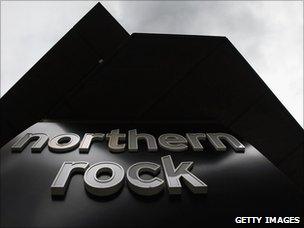No chance of Northern Rock becoming building society again
- Published
- comments

Today's results from Northern Rock more-or-less confirm that the government can't get back the £1.4bn taxpayers have injected into the bank that was nationalised in early 2008.
Although the Rock's losses in the first six months of the year have decreased to £79m from £140m, the value of equity in the business is £1.1bn and falling.
The Rock - in its new slimmed down form - does not expect to trade profitably till the second half of next year.
That isn't a disaster for taxpayers - because any loss on the sale of the bank and its 70 branches is likely to be offset by a profit earned over time on the more than £40bn of Rock mortgages that are being kept on the public-sector balance sheet.
But what will disappoint many MPs and campaigners for mutualisation is that there haven't been any bids from building societies to buy the Rock - with Coventry and Yorkshire building societies both deciding not to submit formal bids by last week's deadline.
In the end, Coventry - which was the more determined of the two societies to get hold of the Rock - could not see how to generate the kind of profits out of the Rock that would allow it to offer as much as other bidders.
So the Rock won't now become a building society again.
Who will end up owning it? Well three and a half years after Sir Richard Branson's Virgin Money first tried and failed to buy Northern Rock, there is a reasonable chance that it will end up buying the bank this time.
Virgin Money is up against bidding competition from a specialist private-equity firm, JC Flowers, and possibly another private-equity bidder. But Virgin may well be able to offer a bit more than them, given that Northern Rock would fit pretty neatly alongside Virgin's existing savings and investment business.
Update, 08:23: Those who want the Rock to become a building society again may be even more irked that there's new evidence that the best building societies are becoming stronger, at a time when the biggest banks are becoming weaker.
Or at least that's true if you take seriously the judgements of credit rating agencies.
Last night Moody's said it was upgrading the credit rating of four large building societies, Nationwide, Yorkshire, Principality and Coventry.
Moody's said its upgrade of the four societies "reflects their performance since the crisis and our expectations regarding their future performance".
This is in stark contrast to the trend for the biggest banks, whose credit ratings are expected to be cut because of the expectation that regulatory reform will mean it is less likely that taxpayers would rescue them or bail them out in a crisis.